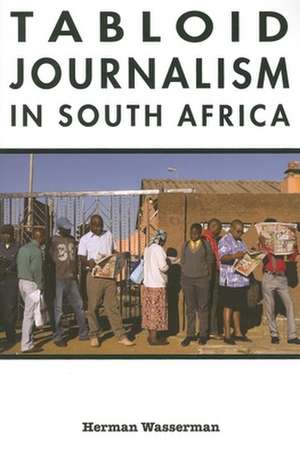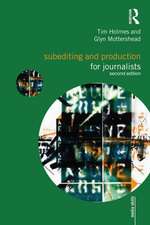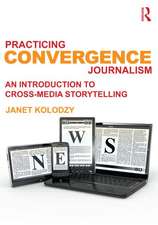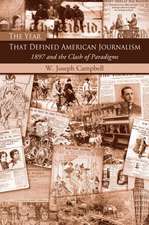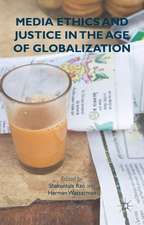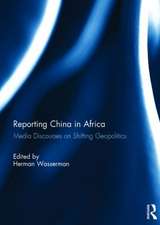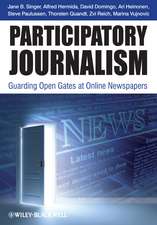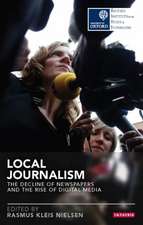Tabloid Journalism in South Africa – True Story!
Autor Herman Wassermanen Limba Engleză Paperback – 30 mai 2010
Preț: 163.23 lei
Nou
Puncte Express: 245
Preț estimativ în valută:
31.23€ • 32.73$ • 25.82£
31.23€ • 32.73$ • 25.82£
Carte tipărită la comandă
Livrare economică 11-25 aprilie
Preluare comenzi: 021 569.72.76
Specificații
ISBN-13: 9780253222114
ISBN-10: 0253222117
Pagini: 240
Ilustrații: 3 b&w illustrations
Dimensiuni: 176 x 226 x 13 mm
Greutate: 0.38 kg
Editura: MH – Indiana University Press
ISBN-10: 0253222117
Pagini: 240
Ilustrații: 3 b&w illustrations
Dimensiuni: 176 x 226 x 13 mm
Greutate: 0.38 kg
Editura: MH – Indiana University Press
Cuprins
Acknowledgments; 1. Shock! Horror! Scandal! The Tabloid Controversy and Journalism Studies in Post-Apartheid South Africa; 2. Attack of the Killer Newspapers! Tabloids Arrive in South Africa ; 3. Black and White and Read All Over: Tabloids and the Globalization of Popular Media; 4. Not Really Newspapers: Tabloids and the South African Journalistic Paradigm; 5. The Revolution Will Be Printed: Tabloids, Citizenship, and Democratic Politics in Post-Apartheid South Africa; 6. Truth or Trash? Understanding Tabloid Journalism and Lived Experience ; 7. Often They Cry with the People: The Professional Identities of Tabloid Journalists ; 8. Conclusion: Telling StoriesNotes; References; Index
Recenzii
"Hugely important for students, journalists, scholars, policy-makers, and practitioners. A much needed book that will contribute, both empirically and theoretically, to ongoing debates about popular culture, media globalization, and changing news discourses." Winston Mano, University of Westminster
"A much needed media history and political and social assessment of a genre that is currently very much the subject of conjecture." Sean Jacobs, University of MichiganHerman Wasserman examines the dramatic growth of tabloid journalism in South Africa and argues that its popularity is a byproduct of the sociopolitical changes brought on by the transition from an apartheid regime to a democratic government. In his multidisciplinary book , Wasserman expertly explains why newspapers matter to South African readers like Rapabi Boithatelo when they are perceived as less and less important in other areas of the world. His study is also an admirable recovery of tabloids as a subject of scholarly analysis and a challenge to the professional journalism community to consider their political significance for readers and tabloid journalists in South Africa. Wassermans work makes a valuable contribution to the ongoing discussions and debates about changes in South African culture and society due to the end of apartheid in 1994. [ }As a whole, Tabloid Journalism in South Africa is a must read for media historians, journalists, and perhaps just about anyone who is interested in ongoing questions about a post-apartheid South Africa. Wassermans work deserves great respect for encouraging a glocalized standpoint of tabloids in South Africa. Perhaps most importantly, Herman Wassermans work shows that tabloid newspaper readers like Rapabi Boithatelo illuminate the failure of the post-apartheid government and mainstream media in South Africa to address the needs of all citizens. - Kim Gallon (Muhlenberg College), on Jhistory, Dec 2012
"A much needed media history and political and social assessment of a genre that is currently very much the subject of conjecture." Sean Jacobs, University of MichiganHerman Wasserman examines the dramatic growth of tabloid journalism in South Africa and argues that its popularity is a byproduct of the sociopolitical changes brought on by the transition from an apartheid regime to a democratic government. In his multidisciplinary book , Wasserman expertly explains why newspapers matter to South African readers like Rapabi Boithatelo when they are perceived as less and less important in other areas of the world. His study is also an admirable recovery of tabloids as a subject of scholarly analysis and a challenge to the professional journalism community to consider their political significance for readers and tabloid journalists in South Africa. Wassermans work makes a valuable contribution to the ongoing discussions and debates about changes in South African culture and society due to the end of apartheid in 1994. [ }As a whole, Tabloid Journalism in South Africa is a must read for media historians, journalists, and perhaps just about anyone who is interested in ongoing questions about a post-apartheid South Africa. Wassermans work deserves great respect for encouraging a glocalized standpoint of tabloids in South Africa. Perhaps most importantly, Herman Wassermans work shows that tabloid newspaper readers like Rapabi Boithatelo illuminate the failure of the post-apartheid government and mainstream media in South Africa to address the needs of all citizens. - Kim Gallon (Muhlenberg College), on Jhistory, Dec 2012
Notă biografică
Descriere
Tabloids hotly debated in South Africa
